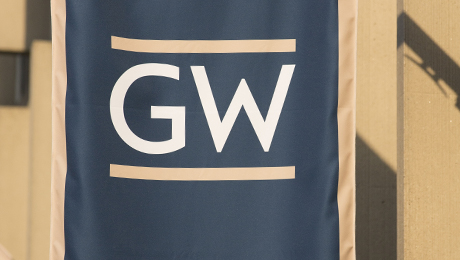As the university prepares its fiscal year 2015 budget, GW is projecting a decline in graduate enrollment, consistent with the national decline in graduate enrollment most universities are expecting as the U.S. economy continues its gradual recovery from the 2009 recession. As the U.S. job market begins to expand, more people are projected to pursue employment opportunities rather than return to school.
Provost Steven Lerman is working with the deans to manage the impact on school budgets and to maintain momentum on the academic priorities of the strategic plan. At the same time, Executive Vice President and Treasurer Lou Katz is working with administrative offices to moderate growth in their spending.
Dr. Lerman spoke to George Washington Today to provide insight and context for the university community.
Q: What is happening with graduate enrollment?
A: Like many institutions across the country, the George Washington University is projecting a modest decline in graduate enrollments for FY 15. This is part of a national trend and reflects the state of the U.S. economy. In a more challenging economy, enrollment in graduate schools typically accelerates and in times of relative economic health, enrollment in graduate schools typically decline as more job opportunities become available. Although a couple of schools, including the School of Nursing and the Milken Institute School of Public Health, are projecting continued growth in enrollments, most schools are projecting either modest declines or flat enrollments, particularly in off-campus programs.
Q: What action is being taken in light of these declines?
A: We are heavily dependent on tuition to fund current operations. Each school’s dean is responsible for balancing his or her budget and, as a result of lower graduate enrollments, deans are being asked to identify ways to offset reduced tuition dollars in their individual budgets. The university’s administrative divisions are also being asked to identify opportunities to reduce expenditures. It is important that we protect the institution’s future by ensuring that our growth in spending is consistent with changes in the resources available while at the same time being strategic in how we adjust expenditures so we keep investing in the future.
Q: How significant is the shortfall? Will there be cuts to personnel or programs?
A: It is important to underscore that we are talking about a relatively small adjustment in our expected fiscal year 2015 expenditures. In the context of the overall university budget, the slowing of expenditures is on the order of 1 to 1.5 percent. I am asking deans, and my colleagues who oversee administrative divisions are asking their staffs, to review short-term opportunities to postpone spending on non-time sensitive needs and be good stewards of resources by exploring strategies such as more favorable renegotiation of contracts that might be up for renewal and making strategic choices on discretionary spending. We want to be smart about how we adjust to this current national trend of lower graduate enrollments while being mindful of how we continue to advance our long-term strategic goals and opportunities.
Q: What do you want to make sure the university community understands about this situation?
A: Although enrollment trends vary by school, I do see this as a university-wide issue that is attributable to a short-term decline in graduate enrollment in a number of programs. Because of our dependence on tuition to meet current expenses, we need to adjust expenditures in a targeted way for fiscal year 2015.
There is no direct connection to undergraduate enrollment, which remains strong, or to the Innovation Task Force, which is a longer-term initiative to find savings and new sources of revenue to invest in academic priorities. Similarly, longer-term improvements to our overall infrastructure that are currently under construction such as Science and Engineering Hall are budgeted separately on a multiyear basis through our capital budget; these capital projects are all essentially on time and on budget and are critical investments in the future of the university.
The flattening of our tuition revenues is also unrelated to fundraising at individual schools or the university as a whole. Indeed, fiscal year 2014 will be our most successful year for development that the university has ever had.
Q: Could funding be freed up from the capital budget to provide the needed operating funds?
A: Modifying the capital budget would not be advisable under these circumstances. It would be unwise to sacrifice long-term investments in the university’s infrastructure to address a short-term need that we believe can be addressed by managing expenditures.
Q: Will this situation affect the discussion underway with the Corcoran Gallery of Art and the Corcoran College of Art + Design and the National Gallery of Art?
A: The Corcoran is an investment in the long-term future of the university. The relationship we are discussing with the Corcoran and the National Gallery of Art is a unique opportunity that will raise the stature of arts education at George Washington and in Washington, D.C. Discussions continue as we work with the other parties on an agreement that will expand the benefits, services and interdisciplinary opportunities that both the National Gallery of Art and GW provide to students and museum visitors.
Q: What is the university doing to boost graduate enrollment?
A: We are taking a number of steps, including creating more online programs, which may appeal to a broader audience of potential graduate students across the country and around the world. Likewise, a number of our schools are designing new programs that we believe will appeal to students. We offer outstanding opportunities for graduate study across many fields and will continue to work to recruit promising students to George Washington.
Q: How is this tied, if at all, to discussions of a new university budget model?
A: It is not. The drop in graduate enrollment is a result of a national trend that is affecting many universities across the country to which we are working to adjust. Separately, we are working on adjusting the existing budget model to further empower schools and give them more flexibility.


